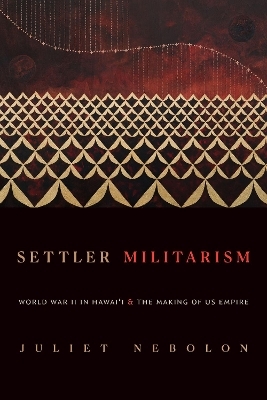
Settler Militarism
World War II in Hawai'i and the Making of US Empire
Seiten
2024
Duke University Press (Verlag)
978-1-4780-2677-8 (ISBN)
Duke University Press (Verlag)
978-1-4780-2677-8 (ISBN)
Juliet Nebolon reveals the mechanisms through which settler colonialism and militarization simultaneously perpetuated, legitimated, and concealed one another in wartime Hawaiʻi for the purposes of US empire building in Asia and the Pacific Islands.
Under martial law during World War II, Hawaiʻi was located at the intersection of home front and war front. In Settler Militarism, Juliet Nebolon shows how settler colonialism and militarization simultaneously perpetuated, legitimated, and concealed one another in wartime Hawaiʻi for the purposes of empire building in Asia and the Pacific Islands. She demonstrates how settler militarism operated through a regime of racial liberal biopolitics that purported to protect all people in Hawaiʻi, even as it intensified the racial and colonial differentiation of Kanaka Maoli, Asian settlers, and white settlers. Nebolon identifies settler militarism’s inherent contradiction: It depends on life, labor, and land to reproduce itself, yet it avariciously consumes, via violent and extractive projects, those same lives and natural resources that it needs to subsist. From vaccination and blood bank programs to the administration of internment and prisoner-of-war camps, Nebolon reveals how settler militarism and racial liberal biopolitics operated together in the service of capitalism. Collectively, the social reproduction of these regimes created the conditions for the late-twentieth-century expansion of US military empire.
Under martial law during World War II, Hawaiʻi was located at the intersection of home front and war front. In Settler Militarism, Juliet Nebolon shows how settler colonialism and militarization simultaneously perpetuated, legitimated, and concealed one another in wartime Hawaiʻi for the purposes of empire building in Asia and the Pacific Islands. She demonstrates how settler militarism operated through a regime of racial liberal biopolitics that purported to protect all people in Hawaiʻi, even as it intensified the racial and colonial differentiation of Kanaka Maoli, Asian settlers, and white settlers. Nebolon identifies settler militarism’s inherent contradiction: It depends on life, labor, and land to reproduce itself, yet it avariciously consumes, via violent and extractive projects, those same lives and natural resources that it needs to subsist. From vaccination and blood bank programs to the administration of internment and prisoner-of-war camps, Nebolon reveals how settler militarism and racial liberal biopolitics operated together in the service of capitalism. Collectively, the social reproduction of these regimes created the conditions for the late-twentieth-century expansion of US military empire.
Juliet Nebolon is Assistant Professor of American Studies at Trinity College.
Acknowledgments ix
Introduction: Settler Militarism, Racial Liberal Biopolitics, and Social Reproduction 1
1. “National Defense Is Based on Land”: Landscapes of Settler Militarism in Hawaiʻi 20
2. “Life Given Straight from the Heart”: Securing Body, Base, and Nation under Martial Law 47
3. “The First Line of Defense Is Our Home”: Settler Military Domesticity in World War II-Era Hawaiʻi 72
4. “A Citizenship Laboratory”: Education and Language Reform in the Wartime Classroom 103
5. Settler Military Camps: Internment and Prisoner of War Camps across the Pacific Islands 129
Conclusion: The Making of US Empire 155
Notes 163
Bibliography 217
Index 231
| Erscheinungsdatum | 25.09.2024 |
|---|---|
| Zusatzinfo | 8 illustrations |
| Verlagsort | North Carolina |
| Sprache | englisch |
| Maße | 152 x 229 mm |
| Gewicht | 499 g |
| Themenwelt | Geschichte ► Teilgebiete der Geschichte ► Kulturgeschichte |
| Sozialwissenschaften ► Ethnologie | |
| Sozialwissenschaften ► Soziologie | |
| ISBN-10 | 1-4780-2677-4 / 1478026774 |
| ISBN-13 | 978-1-4780-2677-8 / 9781478026778 |
| Zustand | Neuware |
| Haben Sie eine Frage zum Produkt? |
Mehr entdecken
aus dem Bereich
aus dem Bereich
der stille Abschied vom bäuerlichen Leben in Deutschland
Buch | Hardcover (2023)
C.H.Beck (Verlag)
23,00 €
vom Mittelalter bis zur Gegenwart
Buch | Softcover (2024)
C.H.Beck (Verlag)
12,00 €
Die Revolution des Gemeinen Mannes
Buch | Softcover (2024)
C.H.Beck (Verlag)
12,00 €


